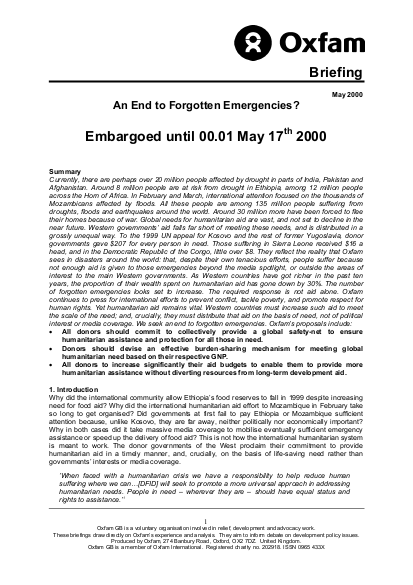
Currently, there are perhaps over 20 million people affected by drought in parts of India, Pakistan and Afghanistan. Around 8 million people are at risk from drought in Ethiopia, among 12 million people across the Horn of Africa. In February and March, international attention focused on the thousands of Mozambicans affected by floods. All these people are among 135 million people suffering from droughts, floods and earthquakes around the world. Around 30 million more have been forced to flee their homes because of war. Global needs for humanitarian aid are vast, and not set to decline in the near future. Western governments’ aid falls far short of meeting these needs, and is distributed in a grossly unequal way. To the 1999 UN appeal for Kosovo and the rest of former Yugoslavia, donor governments gave $207 for every person in need. Those suffering in Sierra Leone received $16 a head, and in the Democratic Republic of the Congo, little over $8. They reflect the reality that Oxfam sees in disasters around the world: that, despite their own tenacious efforts, people suffer because not enough aid is given to those emergencies beyond the media spotlight, or outside the areas of interest to the main Western governments. As Western countries have got richer in the past ten years, the proportion of their wealth spent on humanitarian aid has gone down by 30%. The number of forgotten emergencies looks set to increase. The required response is not aid alone. Oxfam continues to press for international efforts to prevent conflict, tackle poverty, and promote respect for human rights. Yet humanitarian aid remains vital. Western countries must increase such aid to meet the scale of the need; and, crucially, they must distribute that aid on the basis of need, not of political interest or media coverage.